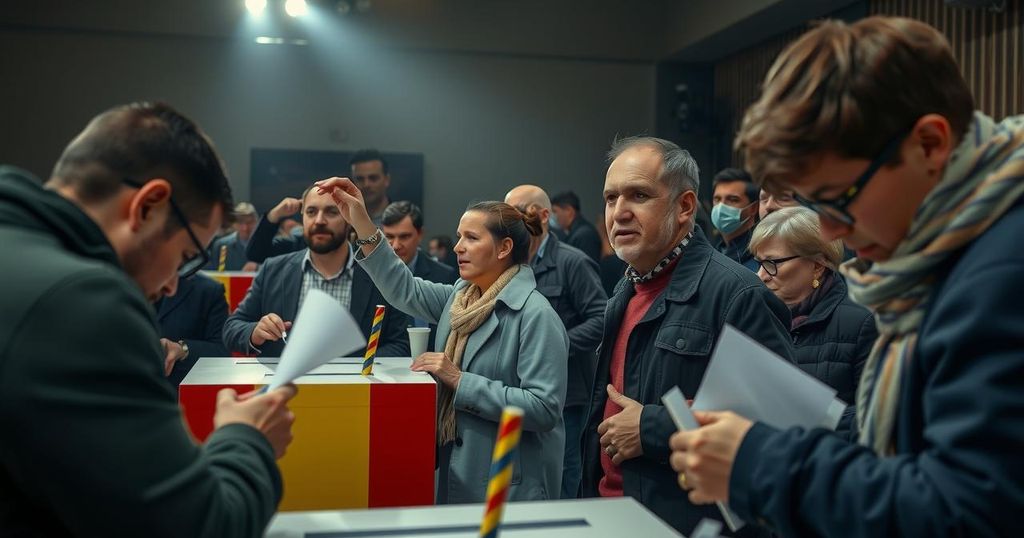Romania Holds Crucial Parliamentary Election Amid Political Turmoil and Allegations of Interference

Romanians voted in a parliamentary election that follows a tumultuous first round of the presidential race marked by allegations of electoral violations and Russian interference. Calin Georgescu, a far-right populist, topped the presidential polls, igniting protests and raising concerns about democracy. Leading parties face uncertainty as Romania grapples with economic challenges and a shifting political landscape favoring populist movements.
On Sunday, Romanians participated in a parliamentary election amid a backdrop of significant political strain and allegations of Russian meddling in the recent presidential race. The election aims to establish a new government and prime minister while determining the composition of the 466-seat legislature. Early reports indicate that as of 5 p.m., approximately 7.5 million voters, or about 42% of those eligible, had cast their ballots, with overseas voting commencing the day prior.
The parliamentary election follows a tumultuous first round of the presidential election, which saw far-right populist Calin Georgescu, a candidate who gained notoriety for his polarizing viewpoints, emerge with the highest number of votes, despite previous polling predicting his initial lack of support. In the impending runoff on December 8, Georgescu will challenge reformist candidate Elena Lasconi from the Save Romania Union party. Public discontent has been fueled by Georgescu’s notable rise on TikTok, leading to protests against his perceived anti-democratic sentiments, including his praise for Romanian fascist leaders and affinity for Russian President Vladimir Putin.
Political analysts predict that the outcome of the presidential race reflects a broader trend within Romania towards populist, anti-establishment movements, spurred by economic challenges such as inflation and a rising cost of living. Political consultant Cristian Andrei noted that the recent political developments could precipitate a transformation in Romania’s political landscape, suggesting an increase in representation for far-right parties.
Regardless of the outcome, the stakes for Sunday’s election are high, as incumbent Prime Minister Marcel Ciolacu emphasized the choice between stability and chaos for the Romanian electorate. Additionally, he stressed the importance of maintaining Romania’s alignment with European and NATO objectives. The election occurs as the nation’s two historically dominant political parties, the Social Democratic Party (PSD) and the National Liberal Party (PNL), navigate an increasingly difficult coalition dynamic, further complicating the political environment.
As Romanians cast their votes, lingering doubts about electoral integrity remain, particularly regarding allegations of misconduct and influence from foreign powers. Nonetheless, the enduring hope for a democratic resolution underscores the significance of this parliamentary and presidential election series for the future of Romania’s governance.
Romania is currently experiencing a significant political upheaval characterized by controversial electoral processes and rising populism. The ongoing parliamentary election is juxtaposed against a recently contested presidential race wherein allegations of electoral manipulation and foreign interference have emerged, particularly regarding purported Russian influence. The heightened political tensions are exacerbated by economic challenges faced by the electorate, leading many to seek alternatives to traditional mainstream parties. This dynamic illustrates a broader European shift towards far-right populist ideologies, raising concerns about the potential implications for democracy and stability within Romania and the region.
The recent parliamentary elections in Romania occur amidst an environment rife with political tension and allegations of foreign interference, particularly regarding the controversial candidacy of far-right populist Calin Georgescu. With emerging populist movements gaining traction against traditional political parties, the electorate is faced with a critical juncture that could reshape the nation’s political landscape. As Romania navigates these challenges, the outcome of both the presidential and parliamentary elections will have lasting implications for the nation’s governance and its relationship with European and NATO partnerships, highlighting the fundamental choice between stability and chaos that voters must confront.
Original Source: www.cnn.com








